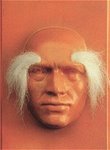Regular readers that did not spend their weekend having their poker game water-boarded may recall that Friday’s post suggested that WSOP winner Peter Eastgate could be an example of what author Malcolm Gladwell calls an ‘Outlier’. (If any people reading this are sufficiently curious, check out the content dated 18th November but be prepared to experience a rapid heartbeat. It may even leave you gasping for breath, confused and with deep psychological scars)
In his book, one of Gladwell’s key points is that there is no such thing as a ‘natural’. To support his position, he cites a study performed at an elite musical school in Berlin: psychologists divided students into three groups: the gifted, the good and those destined to be violin teachers. They were all asked the same question: how many hours have you spent practising?
The psychologists discovered that, although all of the sample had started playing music at roughly the same age (five), by the time the students had reached eight, big differences emerged in the amount of practice between the three groups. The ones that ended up the best in their class practised more – a lot more – than the others. They had reached 10,000 hours of practice by the age of twenty. By comparison, the ‘good’ had reached 8,000 hours, the ones destined to be teachers had only 4,000.
Eastgate, although young, has certainly put in the hours. He has been playing poker professionally since graduating from high school. Sceptics and mathematicians may question if that is enough to have amassed 10,000 hours of poker by twenty-two. No, it is not. However, let’s not forget that he was blooded playing online at multiple tables. Such players can accumulate a lot of Hold ‘em experience in a relatively short time and can therefore cram in more hands an hour than those forced to schlep between venues in order to feel felt.
As the online game is relatively young, the current generation of young players is able to sharpen its game at a rate unprecedented in poker history. It won’t last. In the future the likelihood of the WSOP throwing up a champ who didn’t learn the game online is about the same that Hold ‘em will start incorporating the joker. Absorption in the online game will cease to a method of fast-tracking one’s way to a bracelet: almost everyone will be doing it. However, in 2008, it partly explains why Eastgate is the youngest ever WSOP champion.
In Wednesday’s post, I’ll wrap up the case with a kipper across the kisser of a concluding argument that incorporates more of Gladwell’s thoughts and suggests why there is no such thing as genius.
Monday, November 24, 2008
Subscribe to:
Post Comments (Atom)


No comments:
Post a Comment